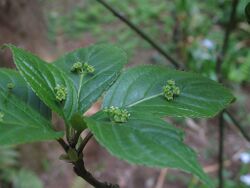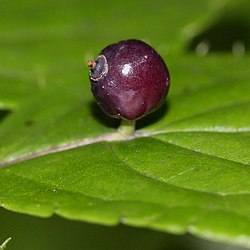Biology:Helwingia
| Helwingia | |
|---|---|

| |
| Flowering Helwingia japonica var. japonica specimen | |

| |
| Detail of epiphyllous Helwingia japonica fruit | |
| Scientific classification | |
| Kingdom: | Plantae |
| Clade: | Tracheophytes |
| Clade: | Angiosperms |
| Clade: | Eudicots |
| Clade: | Asterids |
| Order: | Aquifoliales |
| Family: | Helwingiaceae Decne.[1] |
| Genus: | Helwingia Willd. |

| |
| Distribution of Helwingia | |
The genus Helwingia consists of shrubs or rarely small trees native to eastern Asia, the Himalayas, and northern Indochina. It is the only genus in the family Helwingiaceae.[2][3]
Description
The plants have alternate, evergreen or deciduous leaves and small inflorescences that are epiphyllous (growing from the leaf surface). During development, the flowers appear separate from the leaves,[further explanation needed], eventually fusing with the leaf midrib.[4] Flowers are small and yellow-green or purple, followed by red or black berries. Plants are dioecious.[5]
Epiphyllous inflorescences
This trait is rather unusual among plants. This atypical floral position upon a leaf is believed to be an adaption to insect pollination. Pollinators which are too large to be supported by the floral pedicels, land on the leaf surface and can pollinate the flowers, which would not be able to support the pollinators on their own.[6]
Taxonomy
The APG II classification (2003) places them in the order Aquifoliales, along with the hollies and Phyllonomaceae, which also has epiphyllous flowers.[7]
The family Helwingiaceae does not exist in the Cronquist classification (1981), which places this genus in the Cornaceae (dogwood family). Helwingia has also previously been placed in the Araliaceae (ginseng family).[8]
The family is named for botanist Georg Andreas Helwing.[9]
Species
Species adapted from the World Checklist of Selected Plant Families:[2]
- Helwingia chinensis Batalin - Thailand, Myanmar, China: Gansu, Guizhou, Hubei, Hunan, Shaanxi, Sichuan, Tibet, Yunnan
- Helwingia himalaica Hook.f. & Thomson ex C.B.Clarke - Thailand, Myanmar, Bhutan, Nepal, India: Assam, Sikkim, China: Tibet, Chongqing, Guangdong, Guangxi, Guizhou, Hubei, Hunan, Sichuan, Yunnan
- Helwingia japonica (Thunb.) F.Dietr. - Japan (incl. Ryukyu Islands), Korea, Taiwan, Myanmar, Bhutan, Vietnam, India: Assam, Sikkim, China: Anhui, Fujian, Gansu, Guangdong, Guangxi, Guizhou, Henan, Hubei, Hunan, Jiangsu, Jiangxi, Shaanxi, Shandong, Shanxi, Sichuan, Yunnan, Zhejiang
- Helwingia omeiensis (W.P.Fang) H.Hara & S.Kuros. - China: Gansu, Guangxi, Guizhou, Hubei, Hunan, Shaanxi, Sichuan, Yunnan
References
- ↑ Angiosperm Phylogeny Group (2009). "An update of the Angiosperm Phylogeny Group classification for the orders and families of flowering plants: APG III". Botanical Journal of the Linnean Society 161 (2): 105–121. doi:10.1111/j.1095-8339.2009.00996.x.
- ↑ 2.0 2.1 Kew World Checklist of Selected Plant Families
- ↑ Flora of China Vol. 14 Page 227 青荚叶属 qing jia ye shu Helwingia Willdenow, Sp. Pl. 4: 634, 716. 1806, nom. cons., not Helvingia Adanson (1763).
- ↑ Dickinson, Timothy A.; Sattler, Rolf (1975). "Development of the Epiphyllous Inflorescence of Helwingia japonica (Helwingiaceae)". American Journal of Botany 62 (9): 962–973. doi:10.2307/2441641. ISSN 0002-9122.
- ↑ Sun, Cheng; Yu, Guoliang; Bao, Manzhu; Zheng, Bo; Ning, Guogui (2014). "Biological pattern and transcriptomic exploration and phylogenetic analysis in the odd floral architecture tree: Helwingia willd". BMC Research Notes 7: 402. doi:10.1186/1756-0500-7-402. PMID 24969969.
- ↑ Sun, Cheng; Yu, Guoliang; Bao, Manzhu; Zheng, Bo; Ning, Guogui (2014). "Biological pattern and transcriptomic exploration and phylogenetic analysis in the odd floral architecture tree: Helwingia willd". BMC Research Notes 7: 402. doi:10.1186/1756-0500-7-402. PMID 24969969.
- ↑ Dickinson, T. A.; Sattler, R. (1974). "Development of the epiphyllous inflorescence of Phyllonoma integerrima (Turcz.) Loes.: implications for comparative morphology*" (in en). Botanical Journal of the Linnean Society 69 (1): 1–13. doi:10.1111/j.1095-8339.1974.tb01609.x. ISSN 1095-8339.
- ↑ Hara, Hiroshi; Kurosawa, Sachiko (1975). Ohashi, H.. ed. "A Revision of the Genus Helwingia". Flora of the Eastern Himalayas 3: 393–413. http://umdb.um.u-tokyo.ac.jp/DKankoub/Bulletin/no08/no08022.html.
- ↑ Hinkley, Daniel J. (1 May 2007). "Helwingia". https://www.hortmag.com/.amp/plants/helwingia.
External links
- Aquifoliales - Angiosperm Phylogeny Website, consulted 2007-01-26.
- Helwingiaceae , Watson, L., and Dallwitz, M.J. 1992 onwards. The families of flowering plants: descriptions, illustrations, identification, and information retrieval. Version: 29 July 2006.
- Also see Cornaceae
- Helwingiaceae from NCBI-Taxonomy
- Helwingiaceae, USDA, ARS, National Genetic Resources Program. Germplasm Resources Information Network - (GRIN Online Database). National Germplasm Resources Laboratory, Beltsville, Maryland. Consulted 2007-01-26.
Wikidata ☰ {{{from}}} entry
 |

